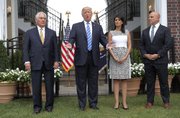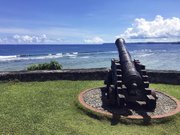President Donald Trump on Friday issued another warning of swift and forceful retaliation against nuclear-armed North Korea, declaring the U.S. military "locked and loaded." He said the isolated nation's leader "will regret it fast" if he takes any action against U.S. territories and allies.
Trump started the morning with Twitter messages warning of the readiness of the U.S. military, then followed up in the afternoon by telling reporters that he hoped the North Koreans "fully understand the gravity of what I said."
At his golf club in Bedminster, N.J., he singled out Kim Jong Un, the North Korean leader, saying Kim has gotten away with destabilizing the region for too long.
"If he utters one threat in the form of an overt threat," or takes action against the U.S. territory of Guam or against U.S. allies, "he will truly regret it and he will regret it fast," Trump said.
[PRESIDENT TRUMP: Timeline, appointments, executive orders + guide to actions in first 200 days]
The North has threatened to fire missiles near Guam, which is about 2,000 miles from Pyongyang.
Asked if the U.S. was going to war, Trump said, without elaborating, "I think you know the answer to that."
Later Friday, the president promised Guam Gov. Eddie Calvo, "You are safe. We are with you 1,000 percent."
Trump's morning tweet said "military solutions" were ready "should North Korea act unwisely." To reinforce the point, the president later shared a post from the U.S. Pacific Command stating that it was standing by for orders should the need arise.
[VIDEO: Daily life resumes as tensions mount in North Korea]
"#USAF B-1B Lancer #bombers on Guam stand ready to fulfill USFK's #FightTonight mission if called upon to do so," the original tweet said.
Trump's comments do not necessarily indicate a specific change in military readiness or any imminent action. The motto of U.S. forces based alongside allied troops in South Korea has long been "Ready to Fight Tonight." There has been little if any sign of mobilization -- such as the evacuation of thousands of American civilians living in the region -- that might suggest preparations for a strike.
The Trump administration has said repeatedly that its diplomatic initiative to pressure North Korea into abandoning its nuclear weapons and ballistic missile program is still in its early phases, with much work remaining.
Secretary of State Rex Tillerson, who along with U.N. Ambassador Nikki Haley met with Trump on Friday, has said the United States was open to talks if North Korea stopped the missile tests that have rattled the region in recent weeks.
The Associated Press reported Friday that talks between senior U.S. and North Korean diplomats continue through a back channel previously used to negotiate the return of Americans held in North Korea. The talks have expanded to address the deterioration of the relationship, according to U.S. officials and others briefed on the process. They weren't authorized to discuss the confidential exchanges and spoke on condition of anonymity.
Trump refused to discuss the diplomatic contacts. "We don't want to talk about progress, we don't want to talk about back channels," Trump told reporters.
Most importantly, the Trump administration hopes to persuade China to use its influence over North Korea's economy and political leadership to resolve the situation for the United States, but analysts say nothing of the sort is likely to happen, at the earliest, until this fall's Party Congress is completed.
"Hopefully it'll all work out," Trump told reporters later Friday, noting that he would soon call President Xi Jinping to coordinate strategy. "Nobody loves a peaceful solution better than President Trump, that I can tell you."
The Chinese Foreign Ministry is on summer break from its daily news conferences, but it posted a written statement Friday with a typical plea for restraint and dialogue.
China hopes that all parties would "speak and act with caution and do more things that are conducive to de-escalating the tense situation and enhancing mutual trust among parties, rather than relapse into the old path of showing assertiveness and escalating tensions," the statement said.
CONCERNS OVERSEAS
Trump, talking to reporters Friday, dismissed the foreign leaders, lawmakers and national security experts who in recent days have called his threats rash and reckless.
"My critics are only saying that because it's me," Trump said. "If somebody uttered the exact same words that I uttered, they'd say, 'What a great statement, what a wonderful statement.'"
Still, some foreign leaders continued to express concerns over his rhetoric.
Russia's foreign minister, Sergey Lavrov, estimated the risk of a military conflict between the U.S. and North Korea as "very high," and said Moscow was deeply concerned.
"When you get close to the point of a fight, the one who is stronger and wiser should be the first to step back from the brink," Lavrov said Friday.
"I don't see a military solution and I don't think it's called for," said German Chancellor Angela Merkel. She declined to say whether Germany would stand with the U.S. in case of a military conflict with North Korea and called on the U.N. Security Council to continue to address the issue.
"I think escalating the rhetoric is the wrong answer," Merkel added.
"Let her speak for Germany," Trump said, when asked about the comment. "Perhaps she is referring to Germany. She's certainly not referring to the United States, that I can tell you."
Prime Minister Malcolm Turnbull of Australia, on the other hand, said his country would support the United States if the ally was attacked by North Korea. In a statement released after a meeting with the defense officials and policy experts on the situation in the Korean Peninsula, Turnbull denounced North Korea's "illegal, reckless, provocative conduct," which he said threatened stability in the region and "put the world at risk."
The three-way mutual security treaty with the United States and New Zealand "means that if America is attacked, we will come to their aid," he added. "If Australia is attacked, the Americans will come to our aid. We are joined at the hip."
Yet New Zealand would not commit. Prime Minister Bill English told news outlet NZN that he was focusing on peace, but if there was military action against North Korea, his country would "consider our contribution on its merits." Foreign Minister Gerry Brownlee told reporters: "Committing to an aggressive response now -- while encouraging all involved to avoid escalation -- is not a position we want to take."
The leaders of France, the United States' oldest ally, and Britain, the United States' closest ally, did not offer fresh comments on the tensions, but Jeremy Corbyn, the leftist leader of the opposition Labor Party in Britain, said war would be catastrophic.
"The idea that anyone can contemplate using nuclear weapons at any stage against anybody is unthinkable," Corbyn, who has advocated that Britain give up its nuclear weapons, told Sky News. "There is no such thing as an isolated nuclear attack. It will kill millions on both sides of the Korean border and, of course, in neighboring countries."
Some analysts expect the tensions between the U.S. and North Korea to escalate in the coming days as both North and South Korea celebrate the Aug. 15 anniversary of the end of Japan's occupation of the Korean Peninsula.
The U.S. and South Korea are due to start joint military exercises from Aug. 21, while Japanese and U.S. military personnel have begun drills on Japan's northern island of Hokkaido that run through Aug. 28.
Information for this article was contributed by Peter Baker, Javier C. Hernandez, Gardiner Harris, Megan Specia, Sewell Chan, Melissa Eddy, Steven Erlanger, Andrew Higgins, Lincoln Pigman and Martin Selsoe Sorensen of The New York Times; by Jonathan Lemire, Matthew Pennington and Edith M. Lederer of The Associated Press; and by Stuart Biggs, Justin Sink, Stepan Kravchenko, Andrey Biryukov, Eddie van der Walt, Jeremy Herron and Toluse Olorunnipa of Bloomberg News.
A Section on 08/12/2017



